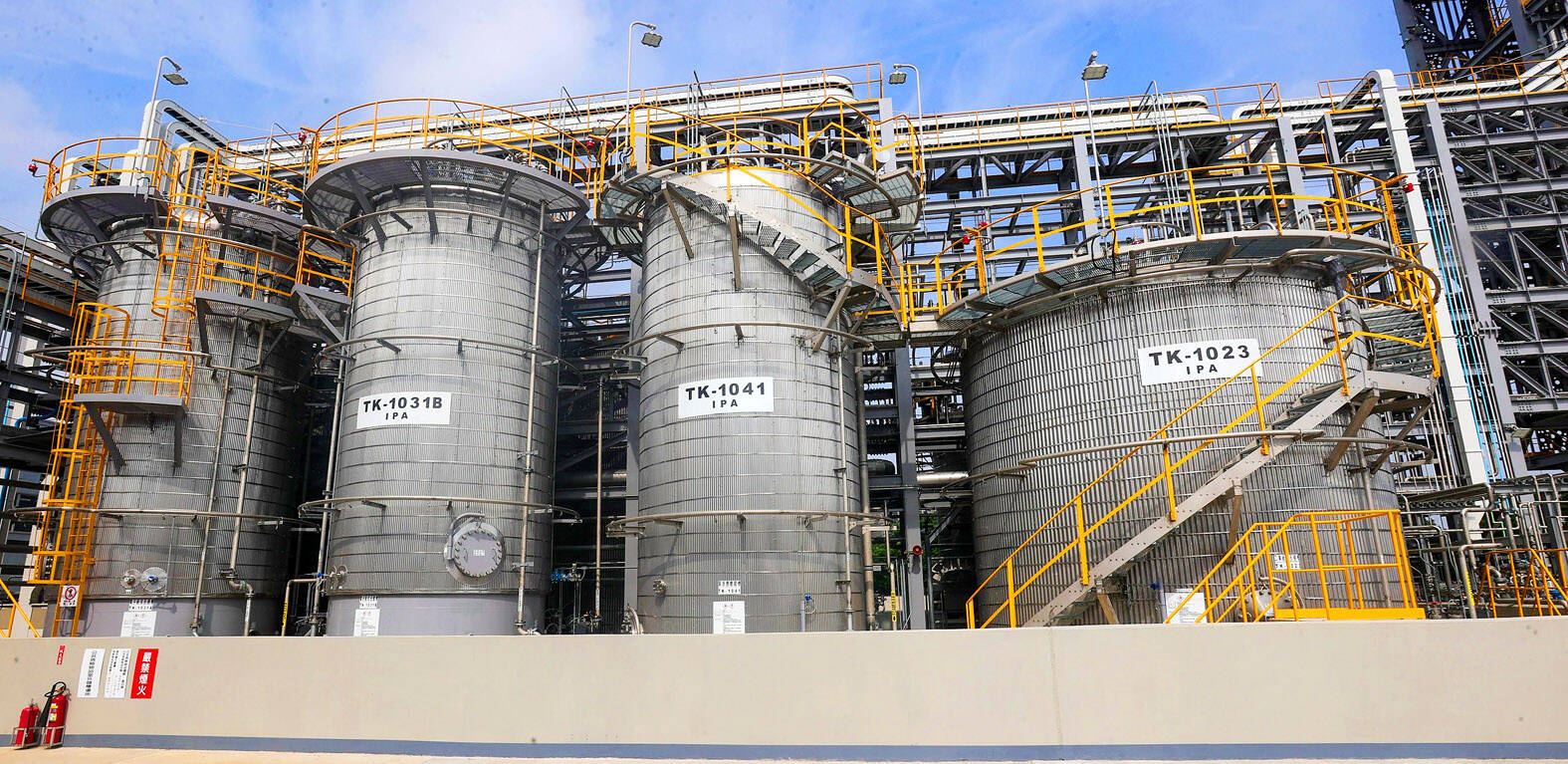Taiwan Semiconductor Manufacturing Co (TSMC, 台積電), the world’s biggest contract chipmaker, yesterday launched its first zero-waste center in Taichung to repurpose major manufacturing waste, which translates into savings of NT$1.5 billion (US$46 million) in environmental costs a year.
The environmental cost savings include a carbon reduction benefit of 40,000 tonnes, equivalent to the carbon offset of over 110 Daan Forest Parks, the chipmaker said.
The Taichung Zero Waste Manufacturing Center is part of the chipmaker’s greater efforts to reach its net zero emissions goal in 2050, aligning with the UN’s 12th Sustainable Development Goal.

Photo: Liao Yao-tung, Taipei Times
The center could reduce TSMC’s outsourced waste processing by 130,000 tonnes each year, accounting for more than 85 percent of the total waste from TSMC’s facilities in the Central Taiwan Science Park, TSMC cochief operating officer Y.P. Chyn (秦永沛) said at the launch ceremony in Taichung yesterday.
“As a global leader in semiconductor manufacturing, we recognize our mission in environmental protection and resource management. Through the Taichung Zero Waste Manufacturing Center, we aim to inspire industries to prioritize and invest in the circular economy, accelerating development momentum to create a better planet for future generations,” Chyn said.
The company plans to create more zero-waste centers at other domestic and international locations, Chyn said.
The center features four major recycling facilities that include fluoride recycling, silica recycling, solvent thermal recovery and isopropanol recovery. TSMC operates the center together with its supply chain partners Chang Chun Petrochemical Co (長春石化), Transcene Corp (成信實業) and Li Ying Environmental Technology Co (立盈環保科技).
Since beginning trial operations last year, the center has purified and recycled chemicals to meet the standards for recycled products. These chemicals are suitable for use in other industries such as steel industry and are being developed into electronic-grade quality for reuse in semiconductor processes, reducing the need for raw material extraction and pioneering a new model of the circular economy, TSMC said.
The zero-waste center has emerged as Taiwan’s pioneering demonstration site for implementing membrane carbon capture technology, it said.
TSMC and the Ministry of Environment yesterday signed a memorandum of understanding to jointly develop this technology, which would be introduced into general waste thermal treatment (incineration) facilities.

In Italy’s storied gold-making hubs, jewelers are reworking their designs to trim gold content as they race to blunt the effect of record prices and appeal to shoppers watching their budgets. Gold prices hit a record high on Thursday, surging near US$5,600 an ounce, more than double a year ago as geopolitical concerns and jitters over trade pushed investors toward the safe-haven asset. The rally is putting undue pressure on small artisans as they face mounting demands from customers, including international brands, to produce cheaper items, from signature pieces to wedding rings, according to interviews with four independent jewelers in Italy’s main

Japanese Prime Minister Sanae Takaichi has talked up the benefits of a weaker yen in a campaign speech, adopting a tone at odds with her finance ministry, which has refused to rule out any options to counter excessive foreign exchange volatility. Takaichi later softened her stance, saying she did not have a preference for the yen’s direction. “People say the weak yen is bad right now, but for export industries, it’s a major opportunity,” Takaichi said on Saturday at a rally for Liberal Democratic Party candidate Daishiro Yamagiwa in Kanagawa Prefecture ahead of a snap election on Sunday. “Whether it’s selling food or

CONCERNS: Tech companies investing in AI businesses that purchase their products have raised questions among investors that they are artificially propping up demand Nvidia Corp chief executive officer Jensen Huang (黃仁勳) on Saturday said that the company would be participating in OpenAI’s latest funding round, describing it as potentially “the largest investment we’ve ever made.” “We will invest a great deal of money,” Huang told reporters while visiting Taipei. “I believe in OpenAI. The work that they do is incredible. They’re one of the most consequential companies of our time.” Huang did not say exactly how much Nvidia might contribute, but described the investment as “huge.” “Let Sam announce how much he’s going to raise — it’s for him to decide,” Huang said, referring to OpenAI

The global server market is expected to grow 12.8 percent annually this year, with artificial intelligence (AI) servers projected to account for 16.5 percent, driven by continued investment in AI infrastructure by major cloud service providers (CSPs), market researcher TrendForce Corp (集邦科技) said yesterday. Global AI server shipments this year are expected to increase 28 percent year-on-year to more than 2.7 million units, driven by sustained demand from CSPs and government sovereign cloud projects, TrendForce analyst Frank Kung (龔明德) told the Taipei Times. Demand for GPU-based AI servers, including Nvidia Corp’s GB and Vera Rubin rack systems, is expected to remain high,